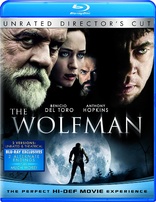The Wolfman Blu-ray Movie
HomeThe Wolfman Blu-ray Movie 
Unrated Director's Cut / Blu-ray + Digital CopyUniversal Studios | 2010 | 1 Movie, 2 Cuts | 119 min | Unrated | Jun 01, 2010
Movie rating
6.3 | / 10 |
Blu-ray rating
| Users | 4.3 | |
| Reviewer | 3.0 | |
| Overall | 4.3 |
Overview
The Wolfman (2010)
Lawrence Talbot, a haunted nobleman, is lured back to his family estate after his brother vanishes. Reunited with his estranged father, Talbot sets out to find his brother... and discovers a horrifying destiny for himself. Talbot's childhood ended the night his mother died. After he left the sleepy Victorian hamlet of Blackmoor, he spent decades recovering and trying to forget. But when his brother's fiancée, Gwen Conliffe, tracks him down to help find her missing love, Talbot returns home to join the search. He learns that something with brute strength and insatiable bloodlust has been killing the villagers, and that a suspicious Scotland Yard inspector named Aberline has come to investigate.
Starring: Benicio del Toro, Emily Blunt, Gemma Whelan, Simon Merrells, Anthony HopkinsDirector: Joe Johnston
| Thriller | Uncertain |
| Horror | Uncertain |
| Period | Uncertain |
Specifications
Video
Video codec: MPEG-4 AVC
Video resolution: 1080p
Aspect ratio: 1.85:1
Original aspect ratio: 1.85:1
Audio
English: DTS-HD Master Audio 5.1
French: Dolby Digital 5.1
Spanish: Dolby Digital 5.1
Subtitles
English SDH, French, Spanish
Discs
50GB Blu-ray Disc
Two-disc set (1 BD, 1 DVD)
Digital copy (on disc)
Bonus View (PiP)
BD-Live
Packaging
Slipcover in original pressing
Playback
Region A, B (C untested)
Review
Rating summary
| Movie | 3.0 | |
| Video | 4.5 | |
| Audio | 5.0 | |
| Extras | 3.5 | |
| Overall | 3.0 |
The Wolfman Blu-ray Movie Review
Even a man who is pure in heart and says his prayers by night may not be able to muddle through the Oedipal nonsense that undercuts this "new, improved" Wolfman.
Reviewed by Jeffrey Kauffman May 26, 2010There is probably no major American film studio as associated with one specific genre as Universal is with horror. Sure, you could make a case for Warners and gangster flicks, or even the often high-falutin’ literary ambitions of Louis B. Mayer’s stomping grounds, but Universal’s penchant for delivering thrills and chills was not only its calling card for many years, it was its saving grace. When Carl Laemmle founded the studio in 1912, audiences would pay to see pretty much anything. By the time the novelty had worn off, Universal turned to Lon Chaney in the 1920’s for such classics as The Hunchback of Notre Dame and Phantom of the Opera, before Chaney left for greener pastures at MGM and then sadly passed away at a young age. By the time the 1930’s rolled around, Laemmle’s son Carl, Jr. was in charge of production and he ushered in the great golden age of Universal horror, starting with Dracula and Frankenstein. A decade later, the studio revisited one of its less successful outings, 1935’s Werewolf of London, creating a signature role for Chaney’s son, Lon, Jr., The Wolf Man. Poor, hapless Larry Talbot returns to his Welsh ancestral home in an attempt to reconcile with his father after his brother’s death, and instead finds himself the pathetic victim of a werewolf’s bite. Wales, evidently a new stomping ground for middle-European gypsies, is full of peasant folklore and superstition, all of which imbue the 1941 film with that sort of faux sinister aspect that makes so many of the Universal features of this period such frankly campy fun a lot of the time. The Wolf Man, despite its relatively brief running time and archaic (to our modern eyes, anyway) special effects, is one of the most atmospheric of all of the Universal horror outings, made palpable through Curt Siodmak’s concise screenplay, George Waggner’s no nonsense direction, and especially Lon Chaney, Jr.’s doleful eyes and sad sack demeanor.

My, what big--oh, never mind.
While Dracula and Frankenstein had literary sources, despite common belief that The Wolf Man sprang from some ancient text of folktales, the fact is the bulk of the film was writer Siodmak’s invention, though several elements were lifted whole cloth from Werewolf of London. Many of the elements of the werewolf mythology that have passed into lore were introduced in either these first two films, or one of the sequels to The Wolf Man. The efficacy of silver bullets, the full moon leading to the hideous transformation of man into wolf, the nefarious imprint of the pentagram, these are all the inventions of either Siodmak or various other screenwriters who brought a different kind of efficacious silver into the Universal coffers.
The first great rush of horror films slowly died out in the late 1940’s and early 1950’s, relegated mostly to Abbott and Costello comedy outings. By the late 1950’s the horror mantle had passed largely to Britain’s Hammer Studios, which revisited several Universal cinema creations (notably Dracula) with its own inimitable style. Somewhere along the line Universal must have gotten the message that it had a very unique set of treasures in its catalog, for aside from re-releasing its evergreen monsters every few years, it too started jumping into the remake fray with such efforts as the 1962 Herbert Lom Phantom of the Opera and 1979’s Frank Langella film adaptation of his Broadway hit version of Dracula.
The modern era of Universal horror no doubt began with Stephen Sommers’ energetic reboot of the Mummy franchise in 1999, followed by several sequels with increasingly diminishing returns. The first two Mummy films at least had a very enjoyable joie de vivre, with a fair amount of thrills and chills thrown in as the mummy mythology was deconstructed and made entertaining for a more hyperkinetic generation. Unfortunately, Joe Johnston’s update of The Wolfman forsakes the humor and fun of at least those first two Mummy revisions for a relentless Freudian interpretation laced with outright Oedipal tendencies that make this version of the tale alternately lethargic and ridiculous. When even an actor of Anthony Hopkins’ formidable skills is left to mutely chew an apple in a scene, glaring away at the camera as if it were Clarice Starling in Silence of the Lambs needing to be intimidated, you know there’s something horribly wrong in the land of the Talbots.
There’s actually the gist of a very effective horror movie at the core of Andrew Kevin Walker and David Self’s adaptation of Siodmak’s original screenplay. Lawrence Talbot (Benicio del Toro) is an acclaimed Shakespearian actor in this version (think John Wilkes Booth, though without the murderous tendencies—at least until the werewolf bites him). Walker and Self gently tweak Siodmak’s kinder, gentler formulation by having Talbot’s father, Sir John (Hopkins) a dour and depressed reprobrate seemingly still in mourning over his wife’s suicide many years previously, a fact that still haunts Lawrence. Lawrence’s brother has died a mysterious and hideous death (can you guess by what means?), leading to Lawrence returning to the ancestral home to try to solve the mystery of what happened to his sibling. His brother’s fiancée (Emily Blunt) is also on hand to assist, and, like Evelyn Ankers in the original film, is named Gwen.
What works very, very well in this film is a stupendously moody production design, beautifully recreating the 19th century gothic environment with a lot of dash and energy. Shelly Johnson’s dark and brilliantly filtered cinematography is also extremely evocative, helping to update the misty Universal ethos that so many fans of the classic 1930’s and 1940’s monster movies love. The CGI elements and Rick Baker’s makeup are also passably effective, though at times the audience may feel they’ve wandered into the strangest bus and truck tour ever of Beauty and the Beast. Unfortunately all of these aspects are mere window dressing around a really silly and hyperbolic revision of the original Wolfman story, as the conflict between Lawrence and his father takes on the proportions of a Greek tragedy, only without the Greek poetry of Sophocles to support it. Del Toro is actually an interesting choice for Talbot, and he embodies the same laconic, doleful countenance that made Chaney forever linked with the hirsute role. But when the film devolves into scenes from a Bedlam like asylum, Del Toro’s very concision works against the drama, making the Hopkins character seem like something out of Grand Guignol by comparison. There is one wonderfully effective scene when Del Toro, ushered into an observation ward by the cheerfully sadistic psychologist attempting to get him to unravel his demons, transforms into the monster while the doctor, his back turned to the transmogrification, waxes philosophical about poor Lawrence Talbot’s delusions. It’s this sort of fun mixed with terror that this Wolfman is sadly lacking most of the time.
This Blu-ray features both the theatrical cut and the extended director’s cut. Johnston, perhaps best known for Jumanji, a film that wonderfully mixed terror with humor, is on record saying one of the reasons the theatrical cut was, well, cut to a mere hour and a half running time was the studio’s insistence that the first transformation to wolf not come at the hour plus mark, as it does in the director’s cut. While that may in fact be true, no amount of cutting can really affect the fact that the central Oedipal thesis of this film is woefully misplaced, especially when it’s mixed with the quasi-Gypsy mish-mash that colored Siodmak’s original conception. Part of the allure of the original Universal horror films was that they were really pretty simple at their core: they set up a horrific monster, often one cast into his demonic role by forces outside of himself, and then let the chills and thrills simply spill from that set up. There was no need of Freudian subtexts, jump cuts and sudden low frequency effects to jolt the audience into sweaty palms. The older Universal films had atmosphere, something that modern filmmakers too often seem to think isn’t necessary in a world of shiny computer special effects programs and whiz bang post processing effects.
The Wolfman Blu-ray Movie, Video Quality 
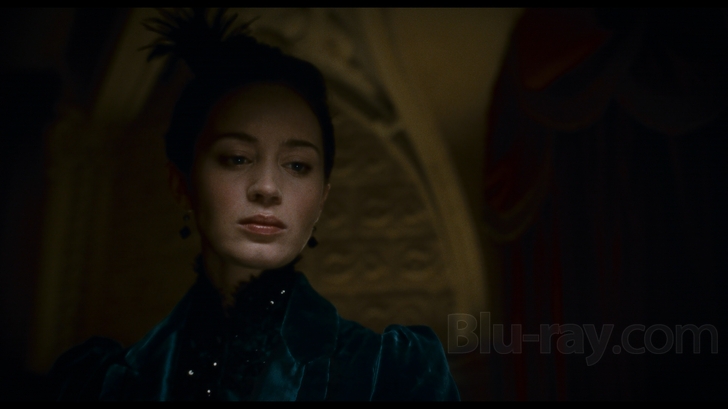
I've taken Universal to task on at least a couple of occasions lately, with their lackluster (some would say awful) Blu's of Out of Africa and Spartacus. Why a major studio with such an impressive array of catalog titles continues to release subpar transfers becomes even more inexplicable when one is comparing it to the largely excellent AVC encoded 1080p transfer (with a 1.85:1 aspect ratio) of a subpar film, as in the case of The Wolfman. Whatever qualms you may have about the film itself, this is a visually sumptuous production, full of gothic shadows and that patented Universal mist, and the Blu-ray lives up to its colorful title and provides the often blue tinged air a very satisfying presentation. Though a great deal of this film is swathed in darkness and shadow, black levels are consistent and sharpness is really astoundingly clear. What I really liked about this film, though, and something which the Blu reproduces brilliantly, is the filtered color work that nonetheless never interferes with accurate fleshtones. Therefore you'll get an inky blue bathed scene which still supports absolute clarity with regard to the humans (and beasts) involved. Baker's makeup really scintillates in this presentation, with every hair on Wolfie's head virtually countable, and the depth of the beast's ferocious mouth a gaping abyss in snarling close-ups for the camera. Though this is one of the more heavily post processed films in recent memory, it actually works for this film, and luckily there's absolutely no evidence of DNR or other digital modes employed to "enhance" the Blu-ray.
The Wolfman Blu-ray Movie, Audio Quality 
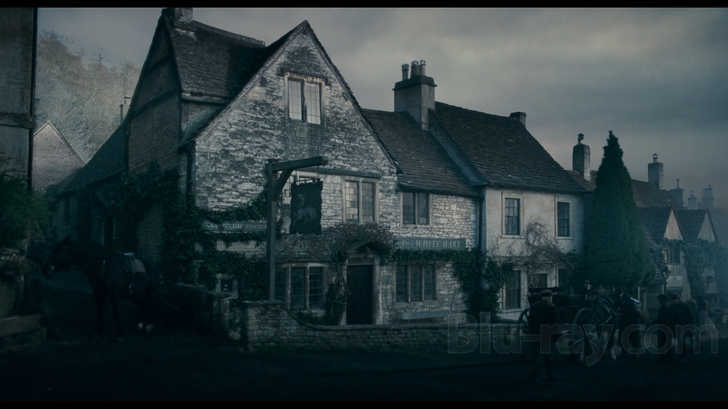
Whatever fun may be missing from the film itself is fully alive, sometimes almost too much so, in an incredibly robust DTS-HD Master Audio 5.1 mix. This is a film which revels in LFE, almost from the very first moment, with sometimes amusing immersion for the astute listener, as when a carriage passes over the camera and the jangling sound of it moving forward clearly passes over the listener's head from rear channels to front. But over and over again The Wolfman exults in sharp thuds and thunks that suddenly erupt out of nowhere and give the film that sense of menace and dread which the screenplay can only hint at. Dialogue is clear and crisp throughout, and ambient effects are extremely well deployed throughout the soundfield in the many outdoor scenes. Even relatively subtle effects like Gwen walking down the haunted hallway of the Talbot mansion are expertly handled, with excellent reverb and directionality. The film itself may leave you cold, but this is one brilliantly realized soundtrack, expertly reproduced in a lossless offering that puts some of Universal's other paltry recent efforts to shame.
The Wolfman Blu-ray Movie, Special Features and Extras 
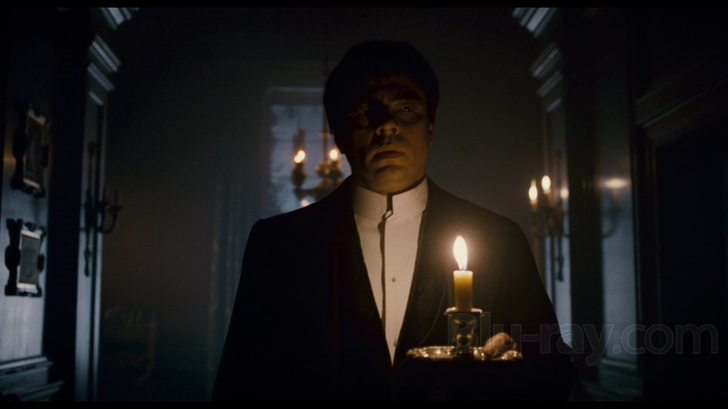
The Wolfman comes loaded with supplements, including two versions of the film, the original theatrical cut and the extended director's cut, which frontloads the proceedings with an extra quarter hour or so of development. That does indeed push the first transformation of Lawrence Talbot slightly past the hour mark, but it provides at least the basis for some character motivation that is lacking in the theatrical version. Also on tap:
- U Control (available on the theatrical cut only) provides two modes of supplemental material, "Take Control," which is very reminiscent of Maximum Movie Mode, featuring various crew discussing aspects of the film, and "Legacy, Legend and Lore," a pop-up feature that explores the background of Wolfie, both in and out of the Universal universe.
- Alternate Endings (HD; 7:58) offers two slightly different endings to the film, but pads these out with several minutes of the same lead-up footage. Either of these endings would have been supremely bone-headed, so luckily wiser heads prevailed.
- Deleted and Extended Scenes (HD; 11:17), features a handful of scenes that were wisely left on the cutting room floor.
- Return of the Wolf Man (HD; 12:20), offers the cast and crew discussing their ambitions to update the Wolfie franchise.
- The Beast Maker (HD; 12:05), probably the best all around featurette on the set, offers makeup wizard Rick Baker discussing his lifelong love affair with the Wolfman and his contributions to the film.
- Transformation Secrets (HD; 15:15), another interesting featurette showing how far film has come from the lap dissolves of the original Wolfie films.
- The Wolfman Unleashed (HD; 8:45), goes into some detail about how the big action set pieces were filmed.
The Wolfman Blu-ray Movie, Overall Score and Recommendation 
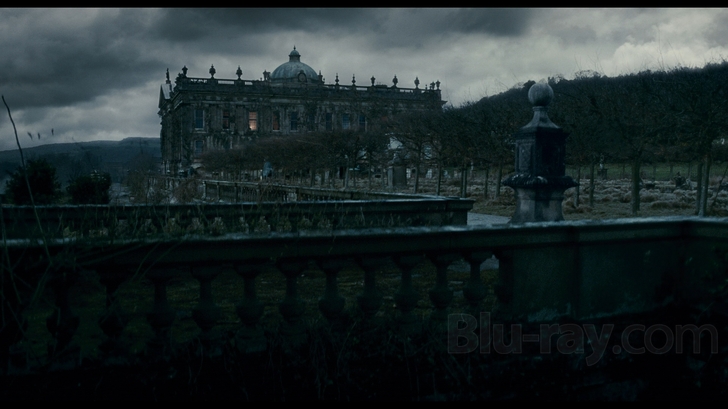
This Wolfman needs some transformative power itself. While it at least makes an attempt, however fitfully, to honor its source material, it adds on too many patently ridiculous psychological layers, weighing the entire enterprise down. Though the film is visually and aurally impressive (both admirably reproduced on this Blu-ray), this is a neutered wolf at best, certainly not a fitting legacy for Larry Talbot.
Other editions
The Wolfman: Other Editions

The Wolfman
Unrated Director's Cut
2010

The Wolfman
Unrated Director's Cut | The Huntsman: Winter's War Fandango Cash
2010

The Wolfman
Unrated Director’s Cut
2010

The Wolfman 4K
Collector's Edition
2010

The Wolfman 4K
Shout Factory Exclusive / Collector's Edition + 2 Posters + Slipcover
2010
Similar titles
Similar titles you might also like

Bram Stoker's Dracula 4K
25th Anniversary Edition
1992

From Hell
2001

The New Daughter
2009

Apollo 18
2011

Intruders
2011

Hatchet
Unrated Director's Cut
2006

Don't Be Afraid of the Dark
2010

Diary of the Dead
2007

The Pack
2015

The Descent
Original Unrated Cut
2005

The Woman in Black
2012

The Haunting in Connecticut 2: Ghosts of Georgia
2013

Splinter
2008

Mama 4K
Mamá 4K | Collector's Edition
2013

The Bye Bye Man
2017

Brahms: The Boy II
2020

V/H/S/2
Unrated Theatrical and Rated Versions
2013

Jaws 4K
1975

Child's Play
2019

Primeval
2007
